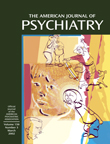Combined Pharmacotherapy and Psychotherapy as Maintenance Treatment for Late-Life Depression: Effects on Social Adjustment
Abstract
OBJECTIVE: This study examined the effects of maintenance treatment for late-life depression on social adjustment. The authors hypothesized that elderly patients recovering from depression would have better social adjustment with medication and interpersonal psychotherapy than with medication or psychotherapy alone. METHOD: Patients aged 60 and older recovering from recurrent major depression were randomly assigned to one of four treatments: nortriptyline and interpersonal psychotherapy, nortriptyline and clinic visits, placebo and psychotherapy, or placebo and clinic visits. The Social Adjustment Scale was administered every 3 months until illness recurrence. Combined treatment was compared to monotherapy on scores over 1 year among patients who remained in recovery (N=49). RESULTS: Patients receiving nortriptyline and interpersonal psychotherapy maintained social adjustment, which declined in those receiving monotherapy. CONCLUSIONS: Treatment of late-life depression with nortriptyline and psychotherapy is more likely to maintain social adjustment than treatment with either alone. Combination therapy improves not only duration but quality of wellness.



